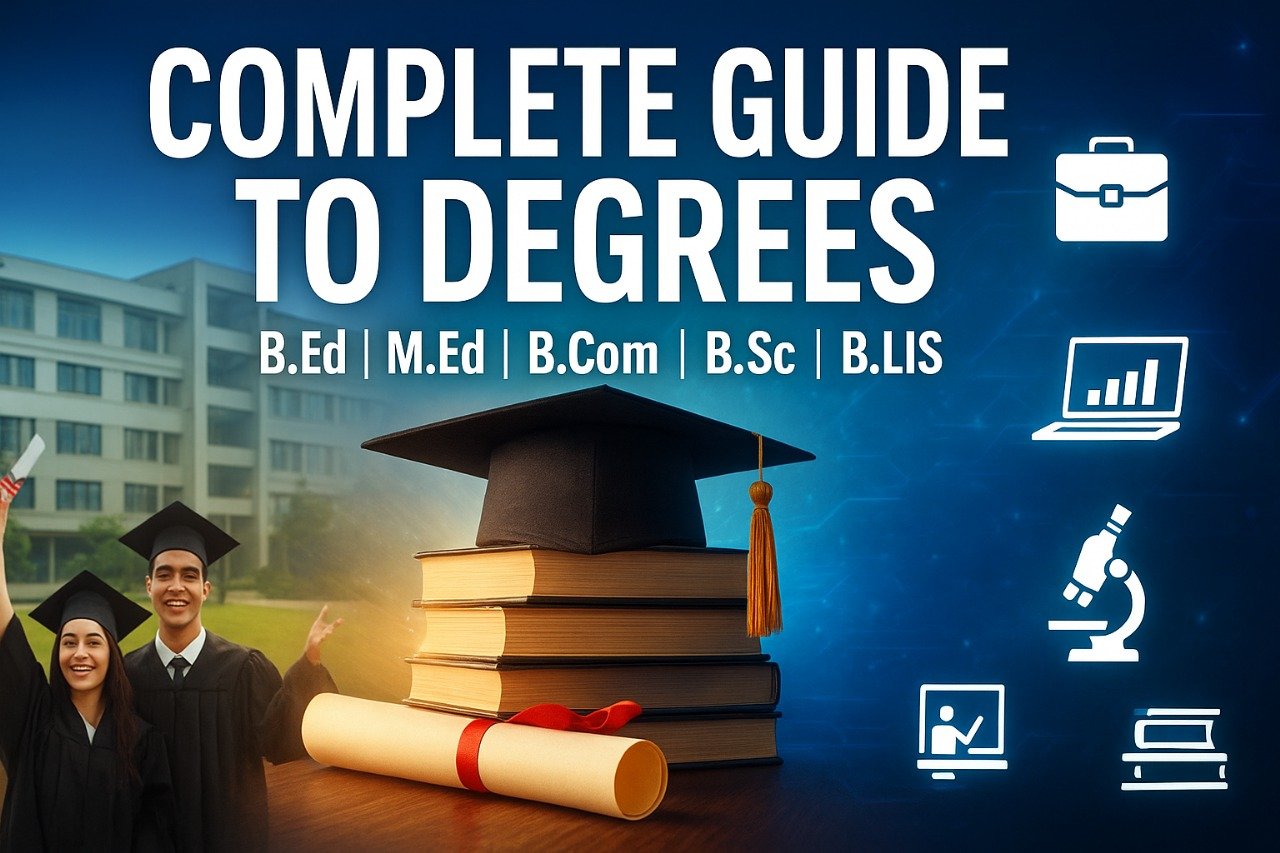1. B.Ed (Bachelor of Education)
What is B.Ed?
A 2-year professional course that prepares students to become school teachers.
Covers teaching methods, child psychology, subject training, classroom management, and educational technology.
Eligibility
Graduation in any stream (Arts, Commerce, or Science).
Minimum 50% marks (may vary by institution).
Career Opportunities
Teacher in primary, middle, or senior secondary schools.
Educational consultant or private tutor.
School coordinator or administrator.
Benefits of B.Ed
✅ Mandatory qualification for government and private school teaching jobs.
✅ Improves public speaking, leadership, and classroom skills.
✅ Provides long-term career stability as demand for skilled teachers keeps rising.
Example
If someone has a B.A. in History, completing B.Ed allows them to become a History Teacher in CBSE/ICSE schools, and later they can apply for government teaching positions after clearing CTET or state TET.
2. M.Ed (Master of Education)
What is M.Ed?
A 2-year postgraduate program for those who want to advance in the education field.
Focuses on educational research, pedagogy, curriculum design, administration, and policy-making.
Eligibility
A B.Ed degree from a recognized university.
Career Opportunities
Lecturer in teacher-training institutes.
School principal, academic director, or administrator.
Educational researcher or policymaker.
Benefits of M.Ed
✅ Provides higher academic and leadership opportunities.
✅ Opens the door to college-level teaching and research jobs.
✅ Essential for those who wish to shape education systems and policies.
Example
A person with M.Ed in Educational Technology can become a Digital Learning Expert, helping schools adopt e-learning tools, smart classrooms, and AI-driven teaching methods.
3. B.Com (Bachelor of Commerce)
What is B.Com?
A 3-year undergraduate program focusing on commerce, finance, and business.
Subjects include Accounting, Economics, Business Law, Marketing, Taxation, and Management.
Eligibility
Completion of 12th grade (preferably Commerce stream).
Career Opportunities
Accountant, Auditor, Tax Consultant.
Banker, Financial Analyst, Insurance Officer.
Business Executive or Entrepreneur.
Benefits of B.Com
✅ A strong base for higher studies like CA, CS, CMA, MBA.
✅ Wide job opportunities in banking, finance, corporate, and government sectors.
✅ Builds knowledge of economics and business practices.
Example
A B.Com graduate can work as a junior accountant in a private company while simultaneously preparing for Chartered Accountancy (CA), which opens up higher-paying opportunities.
4. B.Sc (Bachelor of Science)
What is B.Sc?
A 3-year undergraduate degree that focuses on science and technology subjects.
Available in streams like Physics, Chemistry, Biology, Mathematics, Computer Science, Agriculture, Biotechnology, and more.
Eligibility
Completion of 12th with Science (PCM/PCB).
Career Opportunities
Scientist or Researcher.
Lab Technician or Healthcare Professional.
IT Specialist (for Computer Science).
Teacher or higher studies (M.Sc, MCA, MBA, etc.).
Benefits of B.Sc
✅ Offers a wide choice of specializations.
✅ Acts as a strong base for research, technology, or teaching careers.
✅ High demand in industries like IT, healthcare, agriculture, and pharmaceuticals.
Example
A student completing B.Sc in Biotechnology can work in pharmaceutical labs or continue with M.Sc Biotechnology and join research organizations like ICMR or CSIR.
5. B.LIS (Bachelor of Library and Information Science)
What is B.LIS?
A 1-year professional degree focusing on library management, cataloging, archiving, and digital information systems.
Eligibility
A Bachelor’s degree in any stream.
Career Opportunities
Librarian in schools, colleges, and universities.
Archivist, Documentation Officer, or Records Manager.
Knowledge Manager in corporate firms and research centers.
Benefits of B.LIS
✅ Provides career stability in educational institutions and government libraries.
✅ Relevant in both traditional and digital libraries.
✅ Growing need for data and knowledge managers in the digital age.
Example
A B.LIS graduate can work as a University Librarian, managing physical and digital collections, or as an Information Officer in corporate companies.
🌟 Final Thoughts
Each course—B.Ed, M.Ed, B.Com, B.Sc, and B.LIS—offers unique career opportunities:
B.Ed & M.Ed → Best for those passionate about teaching and education leadership.
B.Com → Ideal for students interested in commerce, banking, and business.
B.Sc → Great for careers in science, IT, healthcare, and research.
B.LIS → Suitable for those who enjoy organizing knowledge and managing libraries.
👉 The key is to choose based on your interest, strength, and long-term vision.

